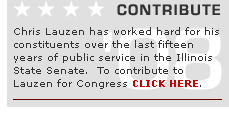|
Campaign News
Endorsements in Full Swing : Campaign News : Lauzen for Congress CommitteeEndorsements in Full Swing
| by By PAUL DAILING
| Sunday, 11/4/2007
|
Politicians, union members, business owners and Nobel Prize winners are among those who have thrown in with the candidates for the 14th Congressional District primary.
Although the only endorsement that counts is the endorsement of the voters Feb. 5, many candidates for the seat held by U.S. Rep. Dennis Hastert, R-Plano, are seeking influential people to put their name to the cause.
Each candidate has a different strategy for getting the names, and allegations of “horse trading” and paying for endorsements always are par for the course.
Today is the deadline for filing for the primary ballot, and many are expecting endorsements to become more prominent in the contentious campaign.
“I guess the real endorsement process begins in the next week or so here when we know who’s going to be on the ballot,” Democratic candidate John Laesch said last week.
Others don’t consider endorsements a priority at all.
“I don’t think people pay too much attention to endorsements,” Democrat Joe Serra said. “I hope the average voter has a mind of his or her own and not listen to a newspaper or another person on who to vote for.”
Priorities
Democratic candidate Bill Foster said he had a three-tier system for seeking endorsements. First he goes for people in political office, then unions. Who’s next?
“Scientists,” the former Fermilab physicist said.
Foster recently secured the endorsements of 19 Nobel Prize winners. This adds to his existing list of scientists, many of whom were Fermilab co-workers, who have thrown in with the campaign.
While Foster courts scientists, state Sen. Chris Lauzen, R-Aurora, goes after the endorsement of issue-specific watchdog groups, groups that have kept tabs on politicians’ voting records on issues like abortion, taxes and gun rights. An endorsement from an anti-abortion group based on his voting record would resonate better with anti-abortion voters than lip service would, Lauzen said.
“The reason I think that the whole process of endorsements is important is you and I both know talk is cheap,” Lauzen said. “You go to people who know what the actual record is.”
Then, go to the people who have worked with you and know you well – fellow legislators in Lauzen’s case.
However, Lauzen’s techniques would only work for candidates who have a voting record. Other groups, such as unions and civic groups, actively seek information from all the candidates, whether or not they have served in a legislative capacity.
“Some of these groups send out applications for endorsements, so if we receive an application for a group we feel really close to, we’ll fill it out,” Democrat Jotham Stein said.
However, candidates should be wary of which applications they complete, said Bill Pascoe, campaign manager for Republican Jim Oberweis.
If a candidate doesn’t have a hope of getting that group’s support, then filling out the petition would just outline in writing where the candidate and the organization differ. This could give the group ammunition against the candidate.
New methods
Republican candidate and Geneva Mayor Kevin Burns is holding his cards close to the vest, endorsement-wise.
“We’re collecting endorsements not from only elected and appointed officials but from business owners, and we’ll be releasing them at the appropriate time,” Burns said.
Although endorsements can reflect the support of the community or influence some voters, they are not the end-all-be-all of elections, Burns said.
“You’ve seen in the past when folks have cleaned up in the endorsement aisle, but have still lost races,” he said.
Laesch said big-name endorsements could be important, but not as important as endorsements and support through the district.
“One of the problems, the reason people in Washington are disconnected, is because they don’t have a grassroots structure,” Laesch said.
Laesch’s primary targets for endorsements are precinct committeepeople. Then, Laesch, a carpenter and former Navy intelligence analyst, goes to the unions.
“I am a member of organizer labor, and I think this is similar to how Mr. Foster reached out to scientists,” he said.
Finally, environmental groups, Democratic organizations and people including Barbara Ehrenreich, the author of “Nickel and Dimed,” are the next targets in Laesch’s “bottom up” approach.
New technology is offering new options for endorsements. Stein collects and posts his endorsements on his Web site. After a period of review, of course.
“It will not automatically show up there,” Stein said about the endorsements, giving the example of one of his Republican counterparts in the race. “If he put his endorsement on our Web site, I would not put it up there. I would not be proud of that.”
|
What they're saying about Chris Lauzen...
I would be honored to join the Lauzen Team and help in any way that I am able, to support Senator Lauzen's run for Congress!
- Pat
|
|
 
|









